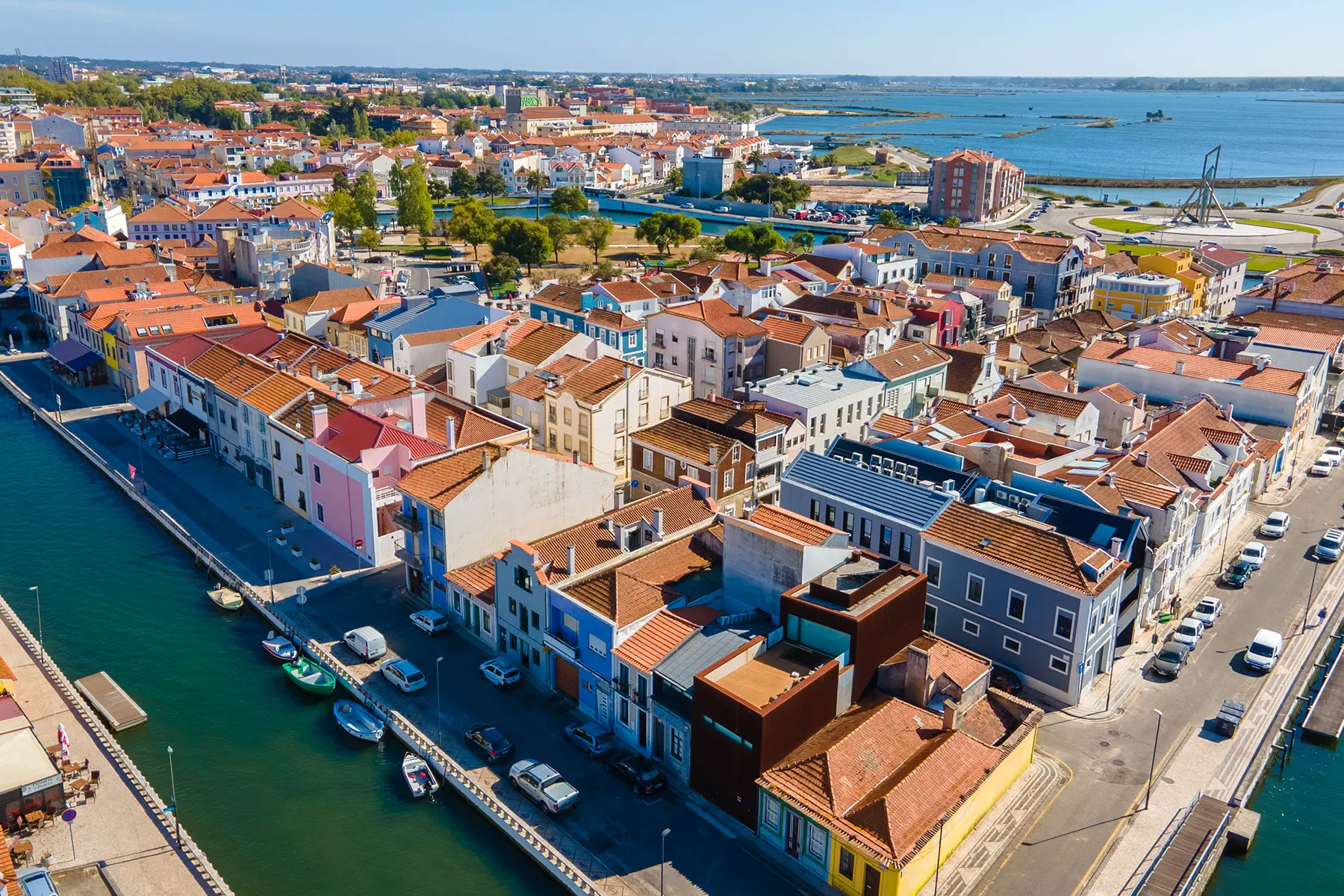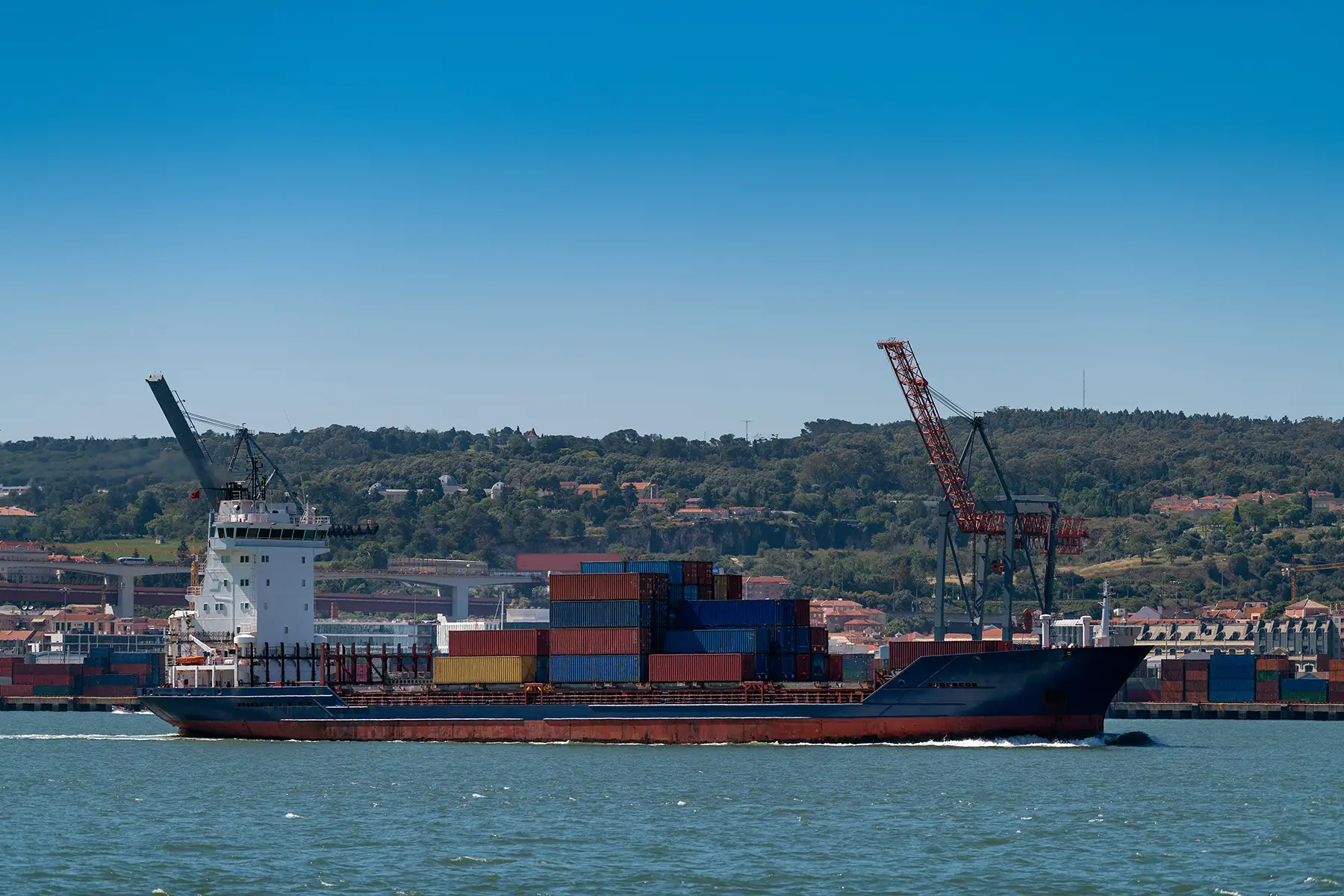There are many options when it comes to sending your belongings to Portugal, including land, sea, and air freight. And while arranging this can feel like a daunting task, it doesn’t have to be, especially with this handy guide that provides all the information you need, including tips on keeping costs down and receiving your belongings on time.
The guide includes the following information:
The Relocator
Preparing for your new life in Lisbon? Or maybe you're retiring on the Algarve? Wherever you're heading, take the stress out of your move to Portugal by letting The Relocator find the right international shipping options for you. Compare a number of trusted international movers and get a free quote in minutes. Wherever life takes you, get there with The Relocator.
Relocating to Portugal from abroad
There are several factors that come into play when moving your belongings to Portugal. These include custom duties and restrictions on certain goods that you might want to import. Of course, you also need to think about how to package your belongings and collect them on the other side, as well as the time period for delivery.

Naturally, cost is an important factor to consider when it comes to choosing the best method for removals to Portugal. After all, while certain relocation options offer substantial savings for large items, such as shipping your furniture or a car, others such as air freight can also add up quickly for heavy items.
Another thing to consider is whether it might be worth hiring an international relocation company to handle your removals to Portugal. They can typically take care of any potential issues, which is ideal for time-strapped expats. However, these services come at a price and whether you use them will depend on how much time you have and your budget. You can read more about this further down the guide.
Moving your belongings with air freight
Before you start planning to move your belongings to Portugal, it’s a good idea to find out which airport is the closest to your new home. Portugal has three international airports, as follows:
Who should use air freight?
Air freight is usually the quickest way to transport your belongings, and therefore a good solution if you have a tight deadline. That said, it certainly isn’t the cheapest option, which makes it less popular than sea, road, or rail. Because air freight typically has a higher carbon footprint than sea freight, it’s also not the best option if you are looking to make your move as environmentally friendly as possible.
How air freight works
The first step to choosing an air freight company will be comparing quotes. This involves working out how many items you need to send and their size and weight. Once you provide the company with these details, they will be able to provide you with an estimated price. You often have a choice whether to pack the items yourself or allow the moving company to do this for you, which is a pricier option but far more convenient.
Your chosen company will then ask you to complete a detailed list of your items and fill in customs paperwork. Once you have organized your paperwork, it’s time to pack or have this done for you. Most air freight companies offer a door-to-door service, so they will pick up your items at your home and bring them to you at your destination. Some also offer to unpack your goods at the other end.
Air freight timings
One of the major advantages of air freight is that it saves a lot of time when compared to other modes of transport. For example, if you are moving to Portugal from another European country, then some companies claim to be able to ship your belongings to you within 24 hours. At most, your items should reach you within a week. Of course, the delivery time will largely depend on where you are sending your items from.

Another key benefit of using an air freight company when relocating to Portugal is being able to send your belongings closer to your moving date. Unlike sea freight which typically requires a couple of months’ notice, air only requires a few weeks.
Air freight rates
As convenient as it is, sending your belongings by air freight can be a costly option and prices are influenced by both weight and size. According to the World Bank, this can reach between US$1.50 and US$4.50 per kilogram.
You will first need to complete an inventory of your shipment, showing its size, weight, and value. Just bear in mind that some companies have a minimum rate of around US$150 in addition to any extra weight; this is several times more expensive than road, rail, or sea freight. And make sure you read the terms and conditions, as some companies don’t ship valuable items.
Packing options for air freight
While companies provide packing services at an extra cost, you are usually allowed to pack your own items for air freight. This is not only cheaper but also gives you more options when it comes to packaging materials.
Although air freight is not the most environmentally friendly moving option, there are some ways to make it a little greener. If you pack your own belongings, for example, consider using reusable containers. After all, suitcases and plastic boxes are more sturdy and durable than cardboard. Packaging materials also come in a range of options; there are even biodegradable packaging peanuts made from cornstarch which dissolve in water. Old newspaper is another cheap, sustainable material that is great for filling spaces.

That said, often, it is better to let the professionals do the packing as it is likely to be more secure, and saves a lot of time and stress. Furthermore, many moving companies are becoming more environmentally conscious and are already making use of sustainable materials.
How to find air freight removals to Portugal
Some airlines offer cargo shipping services, so it’s worth checking the company you are flying with. Otherwise, there are a few comparison websites that will provide you with quotes. These include:
Most companies that arrange removals to Portugal will generate quotes based on your location, the shipment size, and the moving date. It’s also worth comparing quotes from different companies first; after you narrow down your selection, you can discuss your specific requirements further. Just bear in mind that online quotes often only provide an outline of the cost and are unlikely to factor in other charges, such as insurance.
If you’re looking for air freight removals to Portugal, these sites might be useful:
- Global International Relocation – based in Portugal, this firm has an express service available
- Parcel ABC and Sendmybag – these two services are good options if you have a small number of items to send
- Schumacher cargo – this shipping company offers air freight options from the US
Transporting your belongings with sea freight
If you are looking for a way of moving your belongings to Portugal on a budget, them shipping them via a container to a Portuguese seaport is a viable option. There are 18 ports located along the coast of Portugal and some are serviced more than others.
Your items will most likely be shipped to one of the four main ports:
Who should use sea freight?
If you’re transporting a large load or are on a tight budget, then sea freight is a good long-distance option. While this takes longer than air freight, it’s a more economical and environmentally friendly option as it creates a fraction of the amount of CO2 emissions that flying does.
How cargo works
Shipping freight is often a more cost-effective option for sending larger loads. Similar to air freight, you will need to gather quotes from different companies before deciding which ones to use.
Before booking, you might want to consider what kind of shipping you need, such as:
- Full container load (FCL) – your belongings are loaded into a steel container and transported to the port for shipping. Full container loads are transported directly; if you have the contents of an entire house to move, then this could be the best option.
- Less than a container load (LCL) – if you have some belongings but not enough for a full container, they can be crated and shipped in around the same time, for around the same cost, as a full container.
- Groupage – the cheapest method. You can group your belongings with those of other customers. The downside is that the speed of delivery depends on how many other people are moving belongings, so you may need to wait longer if the container isn’t full.
As a rule of thumb, a 20-foot container usually fits the contents of a three-bedroom house, while a 40-foot container is suitable for a four or five-bedroom house.
The most common and convenient option is hiring a door-to-door service where a moving company packs your shipping container and delivers it to your new home. However, this incurs extra costs for work and packing. If you are an experienced mover and want to save money, you can also have the container dropped at your home and fill it yourself. The cheapest option is to ship port to port and arrange your own transport and (un)packing. However, while this is more affordable, it involves a lot more hassle and can be very time-consuming.
Your belongings will also have to go through customs. Therefore, it’s important to familiarise yourself with Portuguese customs and discuss this with your moving company beforehand.
Freight shipping transit times
While it might be cheap, shipping by sea can take a long time; sometimes up to 12 weeks from the point of booking if the items are traveling a long way and you are using a shared container. Therefore, it is best to book your shipping container as soon as you can.

Some companies can arrange an empty container at short notice, however, it’s better to book one around 4 to 6 weeks before you move. Make sure you account for customs in both countries too, as this can take about a day from your country of origin and up to a week once it arrives.
Furthermore, don’t forget to account for how long your belongings will be traveling across the sea. Here are some approximate shipping times from popular destinations to Portugal:
- Brazil: 14 to 19 days
- China: 18 to 23 days
- India: 14 to 19 days
- United Kingdom: 3 to 5 days
- United States: 9 to 11 days
Naturally, shipping from destinations further away will take longer, however, your moving company should provide a timeframe in their quote. It is worth keeping in mind that shipments can also be delayed by bad weather, container shortages, and other unforeseen events.
Maritime freight costs
Freight costs depend on a few factors such as where you are moving from, how much volume and weight you are moving, and whether you hire a door-to-door service.
If you are shipping less than a container load (LCL), it will be sent with other shipments, and you only pay for the volume you need; this can be anything from US$25 to US$140 per cubic meter. When you get a quote from your shipping company, it will include the cost of picking up the item, loading it onto the container, transporting it, unloading it, and delivering it to the final destination. However, don’t forget that there are other costs associated with customs and insurance, so check with your provider to find out if these are included.
If you have more to move, you might want to ship a full container load (FCL). This can also save costs, as it doesn’t require loading and unloading at the ports. Freightos has a handy calculator that can help you work out what you might spend on shipping.
Packing for freight
If you have hired a removals company, they will pack your belongings for you. However, if you are packing yourself, make sure you consider how your items will fit into a shipping container. Sea conditions can be rough, which means that your items will need to be protected from sudden movements. Therefore, wrap them well with a protective material such as bubble wrap. Because ships are prone to humidity, you might also want to consider using a desiccant or wrapping your boxes in plastic. And finally, don’t forget to clearly label your shipment.
If you want to make your packing more environmentally friendly, there are a few options, as follows:
- Recycled or reusable boxes
- Packaging that fits your items as close as possible (while allowing space for protection)
- Recycled-plastic air pillows which are a more sustainable option than bubble wrap
- Biodegradable packing peanuts; but be careful if you choose water-soluble ones, as they could dissolve if they come into contact with moisture
Finding a sea freight company
First, you need to check how many items you have to move and decide whether you will be moving with LCL or FCL and which container size you will need. A comparison service such as Freightos or Freightfinders can help you to assess the prices and services available.
Moving your belongings by road or rail freight
Air and sea are not the only ways to relocate, as you can also move your belongings overland by road or rail. This is a particularly good option if you live in the EU. That said, you might also want to consider this if you live further afield as there are companies that transport cargo by train and road from China, for example.

There are several ways to relocate your belongings by road or train. You can ship them with a company that provides rail freight, hire a moving company, or rent a van and drive your own belongings to Portugal.
Using a relocation company
Using a relocation company might seem like an expensive option for relocating to Portugal, but it also provides the greatest peace of mind. It can also take a lot of time and stress out of the process, leaving you to focus on other aspects of your move.
Timeframes for booking a removal company
If you choose to use a relocation company, you will need to give them plenty of notice; ideally at least three months. To provide a full door-to-door service, the company will need to visit your home and survey your belongings. This consultation process will also help ensure that you get the right insurance for your items.
Packing and international moving companies
It is often worth paying to have your items professionally packed, as they will be able to streamline your belongings and package them more safely. This is especially true if you can get a good deal.
With some relocation packages, the company will insist on packing your belongings and won’t provide full insurance on any items you have packed yourself. You can read more about this in our guide to working with relocation agencies.
How to find an international relocation company
Some relocation companies offer full door-to-door services, which are usually tailored to your needs. You should consider whether you need the full service when gathering quotes. If you just need to sort out shipping, you also have options when it comes to international movers. These international logistics platforms can give you an idea of what to expect in terms of costs and timeframes:
You should choose a company that is registered with an official body in your country to give you peace of mind that they will work to a certain standard. International bodies include the International Federation of Freight Forwarders Associations and the International Air Transport Association. In Britain, companies tend to be registered with the British International Freight Association.
You should always gather quotes from several companies before making a decision, and the more information you can get, the better. Reading customer references and testimonials will also help to confirm your gut instinct about a company.

Because there are so many different costs involved when it comes to removals to Portugal – including packing materials, labor costs, loading, and insurance – make sure you choose a company that will provide a clear price list. That way, you won’t be stung by any excess charges later on.
You should also find out what method you will have for tracking your belongings and what recourse you have if the relocation company fails to deliver them to your new home undamaged or on schedule.
DIY versus using a relocation company
While it is possible to arrange moving your belongings yourself, it is worth questioning how much time you want to spend dealing with the process.
After all, there are many things to consider such as insurance, relevant paperwork, inventories, packaging, customs, collection, and delivery. If your move is less demanding, you can try to handle it yourself. For example, if it’s just a couple of boxes or suitcases, you could move these easily, or even enlist a helper from an online platform such as TaskRabbit.
In some instances, the cost difference between using removals to Portugal and doing it yourself might also be negligible when you factor in time, vehicle rental, fuel, crossing charges, and packaging. You might also find decent prices when it comes to relocating belongings to more popular destinations such as the Algarve.
Relocating vehicles and pets to Portugal
In addition to furniture and belongings, you might want to relocate your beloved pet or car to your new home. And if this is the case, you’ll naturally want to make sure that they arrive safely.
Relocating vehicles
While Portugal has a great public transport system, a car can still come in handy; especially if you need to commute to work or live outside of the city. If you would rather import your own car than buy or rent one, this is possible. That said, it makes moving significantly more complicated. Similar to other possessions, you must have owned the vehicle for at least six months before moving to Portugal. You must also have been resident in the same country as the car for at least six months.
When importing a car into Portugal, you will typically need to present the following documents:
- Proof of residency in your country of origin
- Evidence that you have been living in the country you are traveling from and that you are leaving
- Proof of address in Portugal
- Certificate of origin (Certificado de Origem) from the car manufacturer, if importing from outside the EU
- Any documents for the car
- Customs Vehicle Declaration (Decaração Aduaneira de Veículo)
You will also need to pay two taxes: ISV (Impuesto Sobre Veículos) and IUC (Impuesto Único de Circulação). ISV is paid once to acquire a license plate, and IUC is paid once a year. There are handy online calculators to help you work out how much you will pay for IUC and ISV (in Portuguese), and some exemptions apply. If you are importing a car from outside the EU, you will also need to pay 23% VAT and customs duty of 0 to 10%.
Relocating pets
If you are moving from another EU country to Portugal, you will only need your pet’s passport and a valid rabies certification to enter the country. If you are importing your pet from outside the EU, however, then you should check with your vet to find out if any additional documents are needed.

Pets can travel by air or road, and your transport company can provide information about your options for bringing them with you. You can also read our guide on pet relocation to Portugal to find out more.
Customs and importing goods to Portugal
If you are importing household goods to Portugal from another country in the EU Customs Union, they will be exempt from taxes and duties if they are more than six months old. However, you will still need to present a copy of your passport and an inventory of your items. If you are moving from outside the EU, on the other hand, there are some exempt goods, but it is worth checking which ones you will need to pay tax on.
Non-EU residents will also require a Baggage Certificate (Certificado de Bagagem), which you should be able to get from the Portuguese Embassy in your country. This is a declaration that provides proof that you have owned your goods for more than six months. It also provides evidence that you are a resident in your current country and that you are permanently moving to Portugal. For further information, visit the website of the Portuguese Tax Authority or the Portuguese Portal of Public Services.






